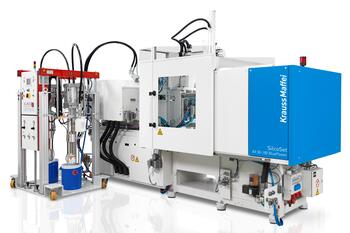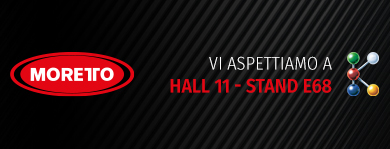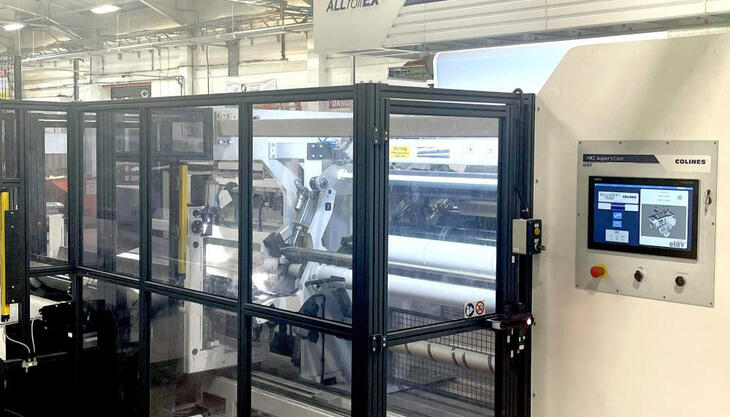
"New areas of application are bringing double-digit growth to silicone processing around the world. It's only logical that we offer our customers efficient solutions for the processing of this material," explains Hans Ulrich Golz, managing director of KraussMaffei and president of the Injection Moulding Machinery segment of the KraussMaffei Group. As part of its specially developed SilcoSet technology, KraussMaffei offers its customers hydraulic, electric and hybrid machines with clamping forces between 350 and 6,500 kN for processing silicone. Retrofitting existing systems is also possible. Injection molding machines with the SilcoSet technology are also suitable for the manufacturing of medical products, particularly those that require clean room conditions.
At Fakuma, KraussMaffei demonstrated the manufacturing of a nasal ventilator made of liquid silicone rubber (LSR) for infants. In doing so, they impressively showcased the trade show's motto of Productivity PLUS. The AX injection unit from KraussMaffei particularly impressed with its perfect interaction between the plasticizing unit and the drive systems. Together, they ensure optimal shot weight consistency. The heart and soul of the plasticizing unit is a non return valve specially developed by KraussMaffei, which guarantees a perfect closing behavior. The "soft" screw with integrate sealing, moreover, conserves the material and consequently increases the quality of the component.
In an all-electric AX, the product run in a four-cavity mould with a clamping force of 500 kN. "A particular challenge during the processing of LSR is the design of the suitable mold. LSR has a consistency ranging from honey to water. The mould must clamp extremely tight and it is often even necessary to create a vacuum," explains Jochen Mitzler, head of strategic product management. KraussMaffei has proven partners for silicone moulds with up to 256 cavities and for peripheral devices and materials. An Elmet metering and mixing unit assumed the task of metering at Fakuma and provided optimum draining of residual fluids, ensuring that no material went to waste. The tool of the Fakuma exhibit also came from Elmet. The material was from Wacker Chemie.
Preliminary silicone products are subject to relatively strong batch fluctuations, which can lead to different viscosities in the material and consequently to fluctuations in the filling behavior of the cavities. The APC function (Adaptive Process Control) records the viscosity of the material during the running process and adjusts the filling volume during the shot directly. The process as a whole becomes more precise; the part weight remains constant. Potentially occurring cross-linking of the silicone can also be balanced using the APC function. "The APC function is a valuable tool for our customers that saves material, time and even costs and consequently increases productivity," says Mitzler. The APC function is offered on all hydraulic, electric and hybrid machines from KraussMaffei.
The SPX 10 servomotor-controlled sprue picker, with advanced function, removed the parts, separated them and placed them within the standard machine's housing. There was no need for a side expansion in the form of a safety fence. This makes the picker the ideal solution for the smallest spaces. Furthermore, the servomotor enables the sprue picker to operate extremely fast and saves on maintenance time and expensive compressed air compared to wear-prone pneumatic drives. The integration into the new MC6 Multitouch control system and the optimized parked position for mould changing round out the user-friendly features. The manufactured gripper produced in the 3D printing process is not only especially lightweight but it can also be simply and quickly adapted to complex jobs.
In addition to processing LSR silicones, KraussMaffei also provides injection moulding solutions for processing solid silicones (HTV: High Temperature Vulcanizing). This includes the AZ automatic feed unit developed by KraussMaffei. Solid silicones are in rectangular blocks before processing. Due to their insulating properties and even higher dimensional stability, they are particularly well suited to applications in the electronics industry or those with high mechanical stress.























